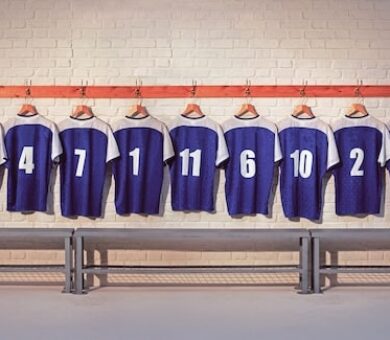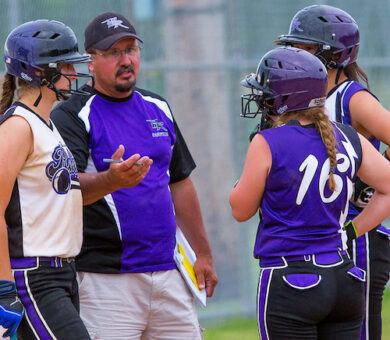Steps to Assist Your Student Athlete With the College Recruiting Process
[GUIDE] Steps to Assist Your Student Athlete With the College Recruiting Process
At the request of several high school coaches, we have assembled a short and quick reference guide to getting started with the recruiting process. There are steps high school coaches can take to prepare themselves, and their student athletes, on how best to navigate the challenging and ever-changing recruiting process.
Step 1: Terminology
Learn the terminology on a basic level. When a student or parent comes to you with a question, it is helpful to know what they are talking about. For example, what is a core course and how can you determine if your student athlete is taking the correct courses?
Understanding terminology can help you locate answers to these questions much easier. The terminology is universal across all divisions and colleges.
Step 2: Governing Associations
Know the difference between NCAA, NAIA and NJCAA (defined below) colleges and where to find information about each. Lots of information is available on the internet about these organizations. For a quick reference, search on these websites for the most up-to-date and accurate information. The most recognized are those listed below.
- NCAA – National Collegiate Athletic Association – Governs college activity in NCAA Divisions I, II and III.
- NAIA – National Association of Intercollegiate Athletics – Governs college activity in NAIA colleges.
- NJCAA – National Junior College Athletic Association – Governs college activity in junior colleges.
Be aware that there are other associations and governing bodies along with those listed above. If your student athletes want to play a sport in college, there are lots of opportunities. Listed below are some of the other associations that could be helpful to your student athletes.
- National Christian College Athletic Association
- National Collegiate Equestrian Association
- USA Collegiate Archery
- Esports

Step 3: Eligibility
Know how to get information about the eligibility for each of the different levels of college sports. Eligibility is the pathway into college. Each collegiate association has rules and requirements for eligibility. Examples of those requirements are: graduating from high school, taking the correct core courses for each high school year and submitting a final high school transcript. You can find more information on eligibility by visiting the associations’ eligibility websites listed below, or simply email us if you have a specific question.
Step 4: Guidance Counselors
Make sure the guidance counselors at the high school are equipped to help student athletes with transcripts, core courses and eligibility. If there are no willing or capable guidance counselors, then the high school coach must step in to help. If you can educate your guidance counselors about collegiate associations and eligibility, you can coordinate the effort to help the student athlete.
Since academics play such a critical role in eligibility, a well-informed guidance counselor can be an important asset to the student athlete in choosing academic course work and the correct path toward graduation.
Step 5: Communication
Commit to communicating every step of the way with your student athletes about the recruiting process. Coaches get very busy, but student athletes need your help with all phases of the recruiting process.
Communicating frequently with the student athletes, parents, and guidance counselors, about how to tackle the issues that come with the recruiting process will really be advantageous for the student athlete’s recruiting journey. If questions arise that you cannot answer, let them know you will find out and get back to them.

Step 6: Participation
Be willing to be an active participant in the process. You may be asked what level of play you think your athlete can play. You may be asked to call or email certain coaches for players or about what the recruiting rules are or even how to address an email. You may be asked to explain terminology. You may also be asked to drive your athlete to a college to make a visit. Whatever comes your way, be willing to help. It will make a difference.
Step 7: Encouragement
Support and encourage your student athlete through the process. Athletes sometimes get attention early, and other times no attention comes at all, or it comes very late in the athlete’s high school career. Either way, showing support will help your athlete stay with the process, which, for some, could be long. The process will be much more difficult for some than for others. There will be lots of ups and downs; there may be pressure to commit or make quick decisions; there may be pressure because no one is calling. It can all be stressful for a teenager.
Step 8: Persistence
Don’t let your athlete give up. If she wants to play sports in college, there usually is a place. That means you can’t give up either.
Dive in with her and find the resources you need to help her. It may be a little more difficult for athletes who don’t have a lot of choices, but it can be done. If you have exhausted your resource list, research and support, then you have done everything you can do. There are no guarantees, but her odds of finding a college increase with your help.

Step 9: Research
Be part of the research to help her find the best fit. Find out as much as you can about the college, academics, coaches, players, campus and community. It is much easier today to find information with social media. Be careful what you read as truth, however. Share this information with your athlete.
You can also help find funding for college if the family needs your assistance. There are ways to fund college beyond an athletic scholarship. You can begin by looking into the state agencies for grant and loan possibilities, local businesses for fellowships and financial aid opportunities, as well as the public library to find some college funding applications. You will learn more and more with each student athlete you help.
Step 10: Go Beyond the Recruiting Process
See each athlete all the way through a commitment to college, and then stay with her as long as she needs you. Help her continue to prepare for college and improve in her sport. Once she gets to college, she may still need your support and advice on how to handle a coach, teammate, professor or the fact that she may not play right away.
Your help as a high school coach can go a long way to preparing your student athletes for the challenges and adversity that will accompany college sports. Be an advocate, and let her parents know that you are willing to assist in whatever way they deem necessary.
The recruiting process is a team effort. That said, if you need more help with, or information about, the recruiting process, please reach out to us. We’re here to help.


